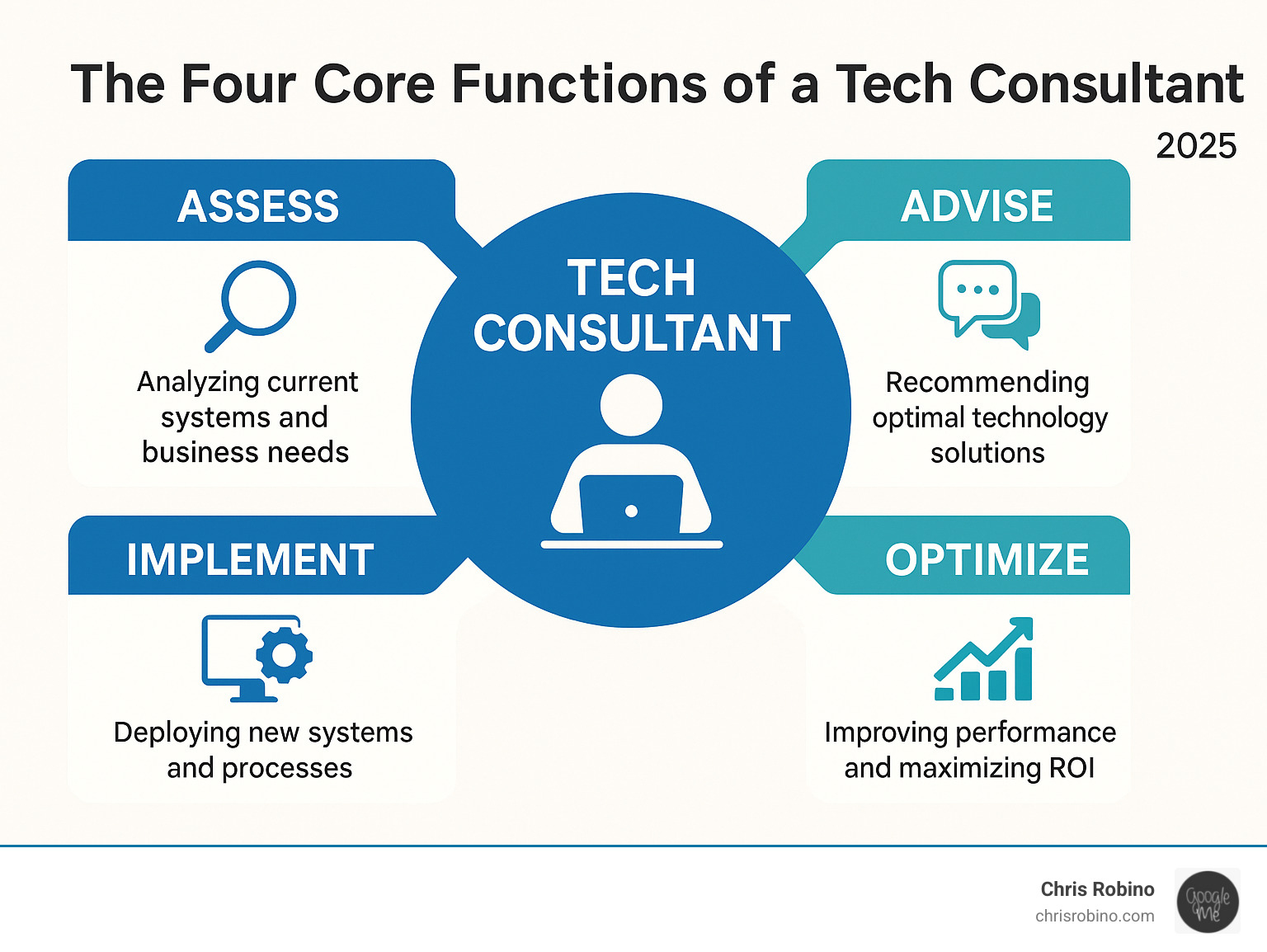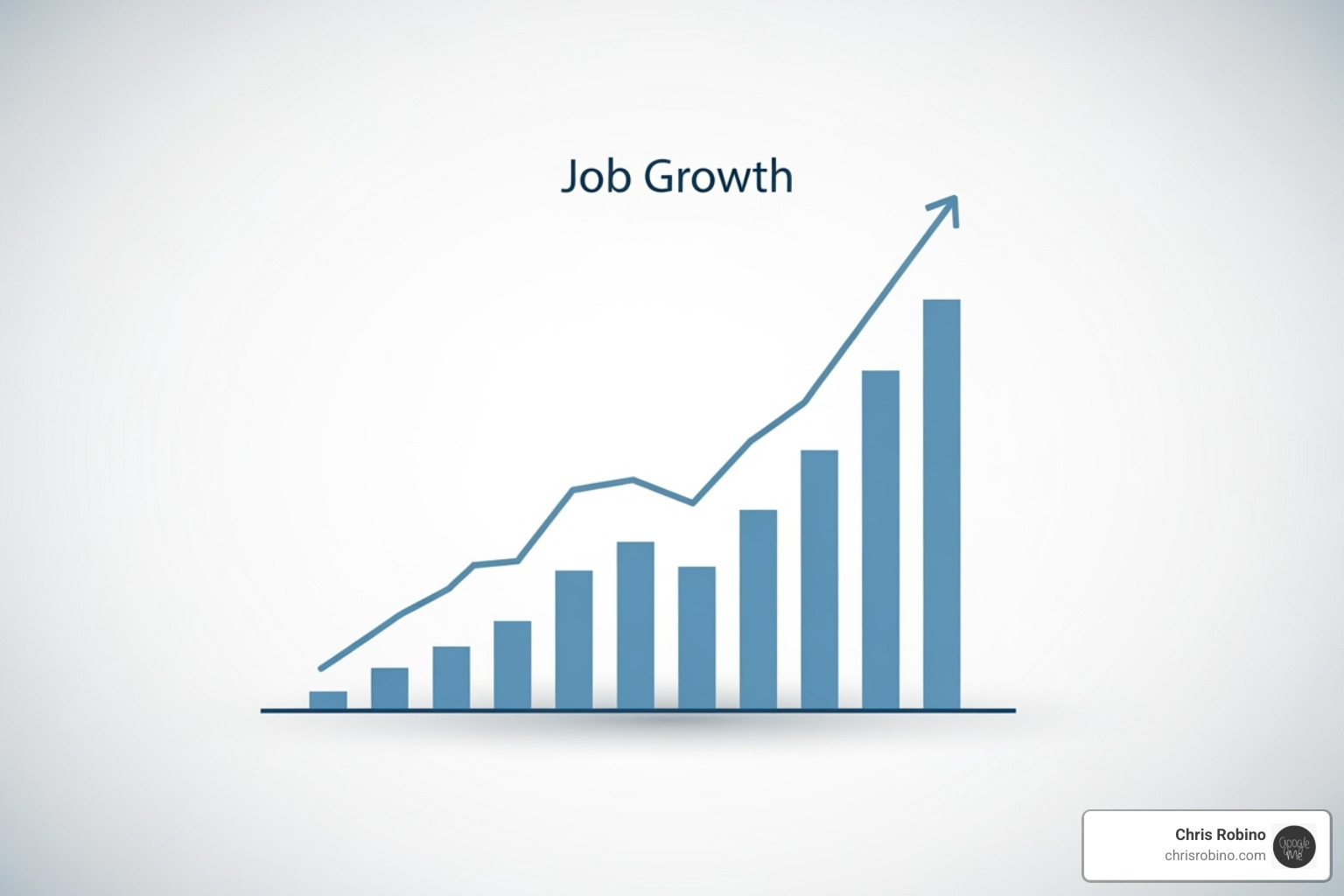What Exactly Does a Tech Consultant Do?
A tech consultant is a professional who provides expert advice to help businesses use technology to achieve their strategic objectives. Here’s what they do:
Core Functions:
- Assess current technology and business needs
- Advise on optimal technology solutions
- Implement new systems and digital processes
- Optimize existing technology for better performance and ROI
Key Responsibilities:
- Technology strategy and planning
- System integration and software implementation
- Digital change guidance
- Cybersecurity and risk management
- Data analytics and business intelligence
- Cloud migration and infrastructure optimization
Many wonder what consultants do. One Reddit user asked if they just “have lunch with the client… & at the end… tell them how to fix their tech problem?” The reality is far more nuanced and valuable.
Today’s business landscape has fundamentally shifted. Every company is now a technology company. A 2023 Statista survey found that nearly 92% of global businesses have adopted cloud infrastructure, while 23% are actively testing AI and machine learning. This digital change creates massive opportunities and complex challenges, requiring expert guidance to stay competitive.
That’s where technology consultants become indispensable strategic partners.
I’m Chris Robino, a Digital Strategy Leader with over two decades of experience as a tech consultant and AI expert. I’ve guided organizations from startups to enterprises through digital change, and I’ll walk you through what this dynamic profession entails.

Decoding the Role: What Exactly is a Technology Consultant?
A tech consultant acts as a translator, bridging the gap between complex IT capabilities and practical business goals. Also known as IT consultants or technology advisors, our mission is to help organizations use technology to grow and thrive.
Many businesses know they need better technology but are unsure what that looks like. As strategic partners and problem solvers, we help them envision and build their technological future, not just fix what’s broken. Our role extends to advising on building, buying, or outsourcing IT functions. For more insights into the broader consulting landscape, check out more on business consulting.
The Primary Role: From Strategy to Execution
A tech consultant’s work moves from strategy to execution, starting with understanding a company’s core business objectives. Once goals are clear, we analyze their current IT setup to find bottlenecks and opportunities. Then, we move to the planning phase: defining project scope, estimating costs, and setting timelines.
The execution phase involves recommending hardware and software that fits the business, overseeing implementation, and ensuring new systems integrate with existing ones. This might involve developing custom software, running tests, or analyzing data.
Critically, we focus on ensuring user adoption. The best technology is worthless if people don’t use it, so we dedicate significant time to training and support. Our goal is to deliver projects on time, on budget, and with complete customer satisfaction. For a deeper understanding of the field, explore this guide on Information technology consulting explained.
The Value Proposition: Driving Business Growth and Innovation
A tech consultant’s value extends beyond technical fixes to measurable business impact. Increasing efficiency is an immediate benefit, often leading to dramatic reductions in operational costs. We also strengthen cybersecurity defenses, protecting data and ensuring regulatory compliance.
Most importantly, we help businesses leverage data for insights, turning information into a competitive advantage. This human-led, tech-powered change turns technology into a strategic asset rather than a necessary expense. We help companies see new possibilities and achieve tangible ROI from their technology investments, turning complex challenges into opportunities for growth. To see how this plays out in practice, take a look at our work on Innovation In Media Companies.
The Consultant’s Toolkit: Core Services and Specializations

A tech consultant is like a Swiss Army knife for the digital world, carrying a toolkit of services to tackle any technology challenge. Our expertise evolves with the constantly shifting landscape.
-
Technology strategy and change: We create a technological roadmap aligned with business goals, ensuring every investment drives strategic outcomes.
-
Digital experience and innovation: We use design thinking and agile methods to create seamless, engaging digital experiences for customers and employees.
-
Data and analytics: We help transform your most valuable asset—data—into a strategic advantage through data governance, analytics platforms, and actionable insights.
-
Cloud engineering: As cloud adoption is now standard, we guide organizations through the entire process, from strategy to execution. We help you reinvent your business in the cloud, not just migrate existing issues. For a deeper look, see our insights on Moving From Ops System To Browser Based To The Clouds.
-
Cybersecurity and privacy: Protecting digital assets is non-negotiable. We advise on risk management, implement security controls, and ensure compliance with privacy regulations.
-
Business applications: We help businesses select, customize, and integrate complex applications like ERP and CRM systems, turning powerful tools into streamlined assets.
-
Emerging technologies: We help clients assess, pilot, and integrate transformative emerging technologies like AI, IoT, and blockchain into their operations without disrupting existing workflows.
Every business faces unique challenges, which is why our toolkit is flexible. The key is knowing which tools to use to solve real problems and create lasting value.
A Day in the Life: The Realities of a Tech Consultant
A tech consultant’s career is defined by variety. No two days are the same, as you dive into different industries, tackle unique problems, and work with diverse teams. The work is inherently client-facing and structured around a project-based environment, requiring constant interaction and a focus on deadlines. Team collaboration is essential for success. Perhaps most importantly, continuous learning is mandatory to keep pace with rapid technological evolution, connecting to the broader concept of maintaining an Optimized Life where personal and professional growth go hand in hand.
The Daily Responsibilities of a tech consultant
A typical day for a tech consultant is and covers a lot of ground:
- Client meetings bookend the day, serving as strategic conversations to discuss progress and plan next steps.
- Requirements gathering is like detective work, involving detailed questions to piece together a full picture of the client’s needs.
- Data analysis involves examining system performance and identifying bottlenecks to find opportunities for improvement.
- Creating presentations and reports is a critical skill, requiring the translation of complex technical concepts into clear, actionable language.
- System configuration is the hands-on part of the job, where you build and customize solutions like ERP systems or cloud infrastructure.
- User training focuses on the human element, teaching people to use new systems confidently.
- Project management is a constant activity, involving tracking timelines, managing budgets, and coordinating teams. For deeper insights, resources like this Information Technology Project Management guide can be invaluable.
Common Challenges and Realities
The work is demanding. Long hours and tight deadlines are the norm, especially during critical project phases. Managing client expectations requires diplomacy to handle initial resistance to change. High-pressure situations are frequent, demanding clear thinking under stress. Scope creep is a constant threat, requiring vigilance and clear communication.
Keeping up with technology is essential, as the field evolves rapidly. Consultants must also focus on maintaining utilization rates, a business pressure to remain billable. The new dynamic of remote vs. on-site work adds another layer of complexity, requiring effectiveness in any environment. Despite these challenges, the variety, problem-solving, and opportunity to make a real impact make the work deeply rewarding.
Forging Your Path: How to Become a Successful Tech Consultant

Becoming a tech consultant is a journey that combines technical, business, and people skills. The career path is flexible, progressing from entry-level roles to senior positions leading major digital change. The field also offers exciting opportunities for specialization in areas like cloud security or data analytics. The key is to align your interests with market needs.
Education and Qualifications
Solid educational credentials open doors. Data shows 66% of technical consultants hold a bachelor’s degree and 15% have a master’s, typically in Computer Science, Information Systems, or Business. However, the ability to think systematically is more important than the specific major. Learning continues after graduation with professional certifications being crucial. Credentials like ITIL, PMP, or other vendor-specific certifications prove your commitment to staying current in a rapidly changing field.
Essential Skills for a Modern Tech Consultant
Success as a tech consultant requires a rare blend of technologist, business strategist, and people person.
| Technical Skills | Soft Skills |
|---|---|
| System architecture & Cloud computing | Communication & Problem-solving |
| Data analytics & Cybersecurity | Business acumen & Adaptability |
| Programming logic & Network security | Leadership & Client management |
On the technical side, you need a firm grasp of system architecture, cloud computing, data analytics, and cybersecurity. Understanding programming logic is also helpful. For large companies, this might involve advising on technical SEO strategies – ensuring their massive digital presence loads quickly, remains secure with HTTPS protocols, and leverages Content Delivery Networks for optimal performance. These technical foundations directly impact search rankings and user experience at scale.
Often, soft skills are more critical. Excellent communication is needed to explain complex topics to executives, and strong problem-solving skills are essential. Business acumen—understanding a client’s goals and pain points—separates good consultants from great ones. Adaptability is also non-negotiable in a field with constant technological change.
Gaining Relevant Experience
Most companies won’t hire a tech consultant straight out of college, as the role requires practical wisdom gained from real-world experience.
- Internships are a golden ticket. They teach you how to think like a consultant—spotting patterns, asking the right questions, and understanding true client needs.
- Entry-level IT jobs provide invaluable experience. Roles like help desk support teach you how technology functions in a business setting.
- Building a portfolio through personal projects or open-source contributions demonstrates your ability to apply technology to solve real-world problems.
- Networking is crucial for finding opportunities. Attend conferences, join communities, and connect with other professionals. As we explore in The Soul Of An Entrepreneur, initiative and genuine connections are key.
Career Trajectory: Job Outlook, Salary, and Industries

The future for tech consultants is bright, as accelerating digital change creates immense opportunity. The career path is flexible, progressing from junior consultant to senior advisor. Many also find exciting exit opportunities, moving into executive roles or launching their own independent practices.
Job Outlook and Growth
The job outlook for tech consultants is excellent. The US Bureau of Labor Statistics projects 15% growth for computer and information systems managers through 2032, much faster than average, with about 356,700 openings annually in IT roles. Globally, demand is surging, with the software consulting market expected to grow 12.1% annually through 2030. High-demand specializations include cloud computing, cybersecurity, data analytics, and artificial intelligence. For deeper insights, see our Tech Industry Report.
Typical Salary Ranges
Compensation for tech consultants reflects their specialized value. In the US, the average salary is an estimated $125,941 per year. In Canada, the median wage is around $45.67 per hour. However, earning potential varies based on several key factors:
- Education & Experience: Higher degrees and more years of experience significantly increase earnings. An entry-level consultant might start around $89,309, while those with 15+ years can earn over $131,331.
- Specialization: In-demand fields like software consulting and cybersecurity command premium rates.
- Industry & Location: Sectors like transportation and manufacturing, as well as major tech hubs, typically offer higher pay.
- Company: Large consulting firms and major tech companies generally provide the most lucrative opportunities.
Who Hires Tech Consultants?
Since nearly every company is now a tech company, tech consultants are in demand across all industries. They are hired by a wide range of organizations. Large consulting firms offer structured career paths, while boutique firms provide deep specialization. Major tech companies hire for both internal and client-facing roles. Many consultants transition to in-house corporate roles in sectors like finance and healthcare. Government agencies offer stable, large-scale projects, and many experienced consultants become self-employed for greater flexibility and higher rates.
Conclusion
The role of a tech consultant has evolved into that of a strategic partner, essential for business success in a digital world. They are the architects of digital change, bridging the gap between complex technology and tangible business outcomes.
This career is both challenging and rewarding. While demanding, it offers the chance to solve complex problems with cutting-edge technology. The profession boasts excellent growth prospects, with the Bureau of Labor Statistics projecting 15% job growth through 2032 and competitive salaries. The diversity of specializations, from cybersecurity to AI, means there’s a path for every interest, developing both technical and soft skills that are valuable across all industries.
From my experience in emerging tech and media, I’ve seen that the right guidance transforms businesses. It’s about crafting custom solutions that deliver real results. The best tech consultants blend technical knowledge with empathy, understanding the human impact of technological change. This human-centered approach is key.
Becoming a successful tech consultant requires a commitment to continuous learning in a fast-evolving field. For those who accept this, the professional and financial rewards are significant. As a tech consultant, you will be at the forefront of shaping the future of business. Explore our projects to see how strategic technology consulting drives real business results.
